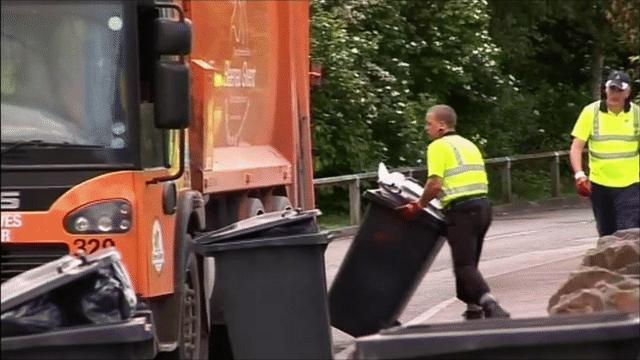Council mergers in Wales must bring 'profound change'
- Published
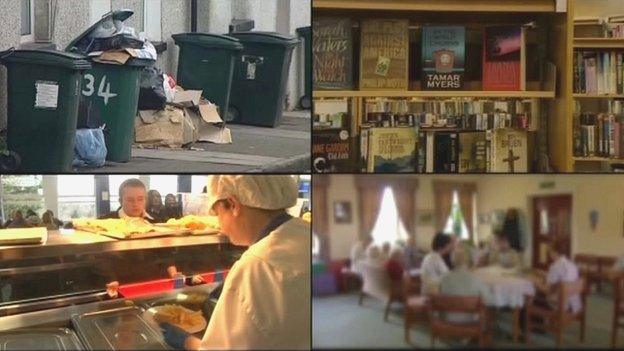
The WLGA says there might be £500m less available for services over the next three years
Merging Welsh councils must lead to "profound change" in how they work, Local Government Minister Lesley Griffiths has warned.
She told the Welsh Local Government Association (WLGA) conference in Llandudno a "cosmetic re-drawing" of boundaries is not enough.
In January, the Williams Commission, external recommended the 22 councils be reduced to between 10 and 12.
But Ms Griffiths faced a scathing attack from the WLGA's leader.
Bob Wellington said it was becoming increasingly apparent to him that there cannot be "English-style cuts combined with Welsh government style ambition".
Welsh Labour could decide this Saturday how many councils it wants, at a meeting of its executive committee.
First Minister Carwyn Jones has called for a "substantial" reduction in the number of authorities.
On Thursday, Ms Griffiths said: "Reforming local government is about more than a cosmetic redrawing of the map of council boundaries to achieve economies of scale.
"While the financial forecasts are not good and local authorities will face more challenging scenarios next year and in the longer term, funding is not the driver for this reform.
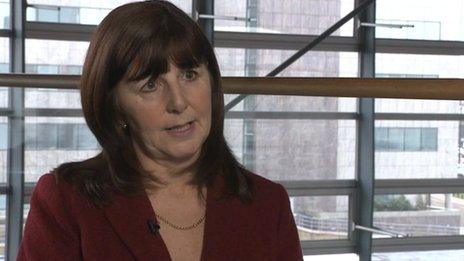
Lesley Griffith said funding is not the driver for the reform
"Larger authorities would make more of the money available for the front-line services, but this reform is about much more.
"It must be a catalyst for profound change so local authorities are fit for this century."
The minister also confirmed the next council elections will be held in 2017 based on the existing authorities, but councils wanting to merge early could face the electors in their new form a year later.


Analysis by BBC Wales political editor Nick Servini
The context of this gathering is hugely significant. Council leaders and chief executives are coming together at a time when plans are being made to put around half of them out of work. Reorganisation will also ensure that the bodies they run will cease to exist in their current form.
Council leaders are warning of the desperate financial challenges ahead. The Welsh government says that's exactly why we need to cut down on the overheads associated with having 22 separate management structures.
But many also say the financial situation is exactly why there should not be reorganisation because it's expensive and a diversion when the focus should be on delivering services.
'Power struggle'
There is also a subtext. There is thinly-veiled contempt for the assembly among some in local government. They see reorganisation as a power struggle between them and an assembly that wants to flex its muscles.
Two days after the WLGA conference, Labour's Welsh executive committee meets in Cardiff for talks which could see the party set out for the first time the council map it wants to take shape.
Interestingly, senior members of Plaid are also meeting this weekend as well to discuss what it wants to see from local government re-organisation.
A deal between Labour and Plaid at the assembly could be the way this is forced through, if council leaders ignore the requests from Carwyn Jones to merge voluntarily.

Later, in a passionate defence of the role of local councils, Mr Wellington warned there was a danger of local government in Wales becoming an "empty vessel reflecting on the glory days when it ran over 700 functions".
Mr Wellington, also the Labour leader of Torfaen, called for an end to regulations and inspections imposed by the Welsh government and insisted council leaders should be more involved in the debate about council reorganisation.
He said that after the publication of the Williams Commission's report five months ago, everyone within local government had expected to be involved in the debate.
"But this dialogue has not materialised," he said.
On next year's budget deal, Ms Griffiths hinted that an estimated cut for councils of 1.5% could be worse.
She told local authority leaders: "You should be prepared for more challenging scenarios for next year."
'Subservient '
The Conservatives called for reorganisation plans to include reform of the "entire relationship between the Welsh Labour government and directly elected local authorities".
After addressing the conference, Welsh Tory leader Andrew RT Davies said: "The current subservient model, where councils are treated like servants of the Welsh Labour government, is unhealthy and represents a barrier to greater innovation amongst local authorities."
Liberal Democrats criticised ministers for not talking to other political parties before announcing the later election date for councils merging early.
Lib Dem local government spokesman Peter Black said: "The fact the minister has made this announcement outside of the assembly, after failing to consult on it, once again shows how her Labour government has no plans whatsoever to properly work with other parties."
- Published18 June 2014
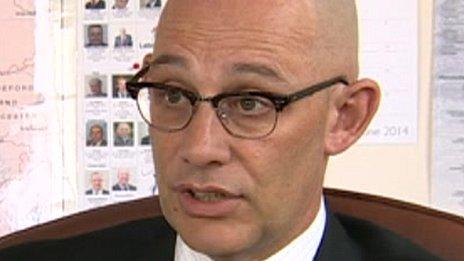
- Published16 June 2014
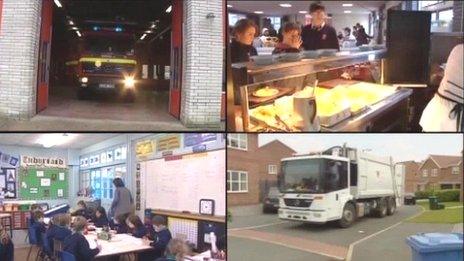
- Published16 June 2014
- Published13 April 2014
- Published20 January 2014
